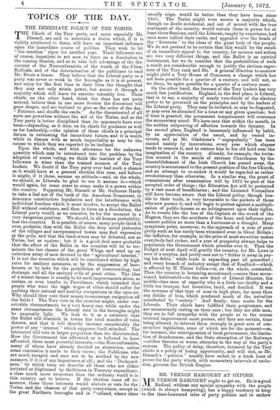TOPICS OF THE DAY
•
THE IMMEDIATE POLICY OF THE TORIES.
Upon the whole, and with allowance for the unknown quantity which may be introduced into the problem by the adoption of secret voting, we think the instinct of the Tory followers is wiser than the trained acumen of the Tory leaders. We doubt if the Tory party ever had such a chance as it would have at a general election this year, and believe it might, if it chose, assume an attitude—and, on the whole, we should, as Liberals, be glad to see it assume it—which would again, for some years to come, make it a power within the country. Supposing Mr. Disraeli or Mr. Gathorne Hardy to take a leaf out of the book of the American Democrats, to denounce constructive legislation and the interference with individual freedom which it must involve, to accept the Ballot Bill without resistance, and then to force on a dissolution, the Liberal party would, as we conceive, be for the moment in a very dangerous position. We should, in all human probability, lose the counties. It is possible, of course, many people think it even probable, that with the Ballot the deep social jealousies of the villages and unrepresented towns may find expression at the polls, and that the landowners may be defeated, not as Tories, but as squires ; but it is a good deal more probable that the effect of the Ballot in the counties will be to ter- minate the last chance of the great Whigs, and send up an unbroken array of men devoted to the " agricultural interest." It is not the counties which will be conciliated either by high rates for sanitary measures, or by the suppression of beer- houses, or by laws for the prohibition of overcrowding, bad drainage, and all the sanitary evils of great cities. The idea of a tenant-farmer is usually to let such improvements alone, as useless, or even insults to Providence, which intended that people who want the high wages of cities should suffer for quitting their natural and healthy occupations in the open air. Why should they vote their money to encourage emigration off the fields f The Tory vote in the counties might, under con- ceivable circumstances, be a very heavy one, while under the same circumstances the Liberal vote in the boroughs might be unusually light. We look to it as a certainty that the Ballot will diminish in towns the total number of votes thrown, and that it will thereby increase considerably the power of any " interest " which supposes itself attacked. The interested will vote in larger proportion than the disinterested. Now the Government has affronted, or is believed to have affronted, three most powerful interests, the Nonconformists, many of whom have already decided on abstention, unless some concession is made to their views ; the Publicans, who are much enraged, and sure not to be soothed by the new measure, if it is of any importance at all ; and the " Dockyard- men," by which term we describe all those who are either irritated or frightened by thriftiness in Treasury expenditure, a class much more numerous than the ordinary world is in this country apt to believe. If the election came off to- morrow, these .three interests would abstain or vote for the Tories, and the chances of that party everywhere, except in the great Northern boroughs and in Pcotland, where ideas usually reign, would be better than they have been since 1845. The Tories might even secure a majority which, though no doubt accidental, and out of accord with the true sentiment of the country, would sustain them in power for at least three Sessions, until the Liberals, taught by experience, had once more rallied their ranks, and appealed over the heads of the " Interests " to the ideas of the great body of the people.. We do not pretend to be certain that this would be the result of an immediate appeal to the country, for menace and action are two very different things, and the Ballot is an untried. instrument, but we do consider that the probabilities of such a result are considerable enough to justify the obvious eager- ness of the Tory rank and file. A general Election to-morrow might yield a Tory House of Commons, a change which has not been possible for a quarter of a century, and will not, as we deem, be again possible for a quarter of a century more.










































 Previous page
Previous page